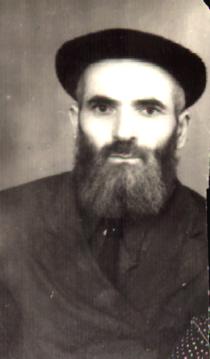This photograph was taken in the early 1930s in Kishinev on the birthday of my grandfather Ihil Stiepelman. It was a family reunion. In the top row from left to right: Aunt Sima’s husband, Joseph Epelbaum - the man in a kippah, with the beard; my father, Jacob Stiepelman is behind him; the girl in the white dress next to him is my cousin Mara Epelbaum, the daughter of Joseph and Sima; my nephew is in her arms. The second from the right, the man with a hat is Aron Dorf, the husband of my father's sister Lubov; Abram Vertman, the husband of my father's sister Basya, is next to him. Sitting from left to right: Sima Epelbaum; my mother Haya Stiepelman is behind her; my grandfather Ihil (with a gray beard) is next to her; the lady on the right, dressed in a dark dress is father's sister Lubov Dorf, Basya Vertman is next to her. Below is my brother Motle Stiepelman; my sister Rahil, in a dark dress, is next to my mother. Bluma is sitting on the floor to the right. I don’t remember the rest of the people. This picture was kept by Aunt Sima in evacuation.
My paternal grandfather, Ihil Soifer, was born in 1860 in the small town of Medzhibozh, located in South-Western Ukraine. My grandfather's name means ‘a man, who rewrites the Torah’ in translation from Yiddish. Men of his lineage were involved in this honorable and complicated matter from the ancient times. My grandfather fixed the Torah, wrote holy scripts, which were put in the tefillin and mezuzah. He got married at the age of 18. I didn’t know Grandmother Riva. All I know is that she gave birth to ten children, five sons one after another - Abram, David, Monya, Isaac and Jacob and five daughters - Reizl, Dvoira, Basya, Sima and Lubov. All children got only elementary Jewish education. The girls were taught by a melamed and the boys went to cheder.
In the 1910s the large Soifer family moved to Bessarabia - either they were looking for a better living or trying to find shelter for their sons not to be drafted into the army. All my grandfather's sons were very religious and the army service would have been a kind of moral ordeal for them. Three sons - David, Monya and Isaac found a solution: immigration to the USA. Grandfather gave a bribe, which cost him a lot of money, to get a new passport in the name of Stiepelman so that the Soifers would vanish into thin air.
So this is how it happened that the whole family acquired a new name: Stiepelman. Thus, my father and his siblings had that surname. The family moved to Kishinev and settled there in a rather nice house, purchased for the money acquired for the sold house. They got a husbandry - chicken and geese. Ihil kept on religious activity there.
Father's younger sisters Sima, Basya and Lubov lived in Kishinev all the time. Sima, born in the late 1890s, was married off successfully. Her husband, Joseph Epelbaum, was a literate, well-educated and religious Jew. He was the secretary and the right hand of Kishinev Rabbi Zirelson. Joseph made good money and his family - Sima and five children were well-off.
Basya, born at the beginning of the 1900s was married to a Jew, Vertman. He worked as a salesman for some owner of a store. He didn’t make much money, but it was enough to make a living for his wife Basya and their three daughters - Rahil, Lida and Riva.
My father's youngest sister Lubov, born in 1911, was married to a goldsmith, Aron Dorf. Her husband didn’t have Romanian citizenship and was exiled somewhere for salt processing. When the Soviet regime was installed in Bessarabia he stealthily came back to Kishinev. Basya lived in Kishinev with her sons Buma and Haim during that period of time.
My father Jacob Soifer, the youngest of the sons, born in the early 1890s, changed his name to Stiepelman. Father didn’t get any education. He even didn’t go to cheder. Grandfather Ihil was his teacher and he gave all his knowledge to his favorite son. He lived with my grandfather at that time and spent time studying and praying before he got married. He was not that young when he got married. It was a prearranged marriage. His wife-to-be was from the Moldovan village Gura Galbeney. Her name was Haya Feurman.



